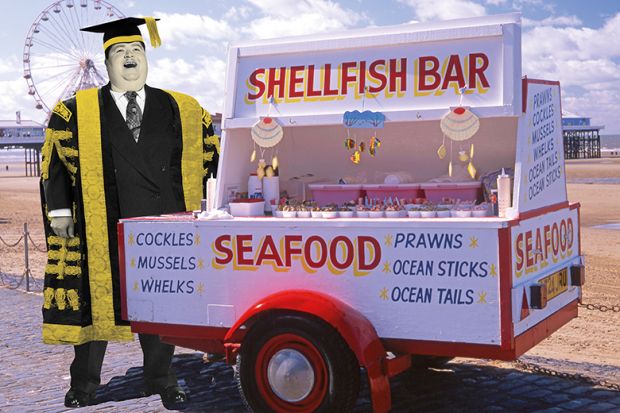Hands off vice-chancellors!
“Quite magnificent. She has my full support.”
That was the response of our vice-chancellor to the news that Louise Richardson, the vice-chancellor of the University of Oxford, had roundly condemned the “mendacious media and tawdry politicians” who were currently undermining the British higher education sector with their attacks upon vice-chancellors’ salaries.
As an example of just such a “tawdry politician”, he cited the MP for Poppleton East, Mr Bill Boanerges (Lab), who recently described the Poppleton vice-chancellor as “a second-rate academic from a third-rate Scottish university who earns over £300,000 a year despite lacking the management expertise that would normally equip someone to run a medium-sized whelk stall”.
Our vice-chancellor was also incensed by the suggestion in the “mendacious media” that there was something inappropriate in the news that, along with almost two-thirds of other vice-chancellors, he sat on his own remuneration committee.
“What these mendacious media reports consistently fail to mention is that these vice-chancellors invariably choose to leave the room during this part of the committee’s deliberations. I, myself, actually choose to supplement that impartiality not only by vacating the room but by shutting the door behind me as I leave.”
Post vacation requirements
All serving Poppleton academics are now required to complete the seven-page Post Statutory Leave Form (PSLF).
As this is the first year in which this form has become mandatory, we are pleased to list a number of recommendations that will serve to improve the ongoing functionality of your responses.
Q5. Destination. Please give a specific answer to this question. Not just “Devon” but “a modestly priced Torquay B&B with on-site bar, full use of cruets, only eight minutes’ walk from the sea”.
Q14. Impact of vacation. Avoid such general statements as “modest suntan” and “good piss-up” in favour of specific references to certifiable improvements in health and sanity.
Q17. Vacation reading. Bland references to “the big one by the Indian woman” or “the one about killing Donald Trump” should be eschewed in favour of reading relevant to your academic specialism.
Q29. Generation of innovative thoughts. Please omit such personal reflections as “initiated divorce proceedings” in favour of concrete plans for research excellence framework success.
Q44. Networking. This response should include only career-relevant encounters and not gratuitous references to “muscular lifeguards”.
Thank you for your cooperation.
My name is legion
Our leading producer of unreplicable social psychology research findings, Dr Mike Goshworthy, has given a qualified welcome to a new metric that will measure the number of times an academic cites their own work.
He agreed that there were instances where such self-referencing might be construed as evidence of egoism (Goshworthy, 2009) or incipient narcissism (Goshworthy, 2010); however, the suggestion that this was indicative of what the metric producers call “abuse” not only ran contrary to empirical evidence (Goshworthy and Goshworthy, 2013) but also raised the possibility of devaluing those academics who had shown their thoroughgoing commitment to the REF by concentrating on the publication of research that favoured self-advancement over knowledge production (Goshworthy, Goshworthy and Goshworthy, 2016).
Register to continue
Why register?
- Registration is free and only takes a moment
- Once registered, you can read 3 articles a month
- Sign up for our newsletter
Subscribe
Or subscribe for unlimited access to:
- Unlimited access to news, views, insights & reviews
- Digital editions
- Digital access to THE’s university and college rankings analysis
Already registered or a current subscriber? Login
